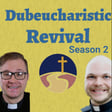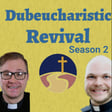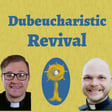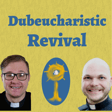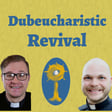
3: What Is The Plan?
Deacon Keith McCarraher, ordained in 2019, has worked for the Archdiocese for a little over a year managing the IT department and serving as the Co-Director of Pastoral Planning & Leadership Development.
Kim Hermson, ED.S. has been a faithful servant of the Archdiocese of Dubuque for 26 years: Catholic School Principal for 15 years, Superintendent for 8 years and is now starting her 4th year as Co-Director of Pastoral Planning and Leadership Development.
As our guests on this episode, they provide the nuts and bolts of what the Journey In Faith plan actually looks like
https://www.dbqjourneyinfaith.org/
Journey in Faith Prayer
Lord Jesus,
You accompanied your disciples on the way to Emmaus.
As we journey in faith,
we trust in your Spirit
to open our eyes
to set our hearts on fire
and to transform our parishes.
Make yourself known to us
through breaking open word and bread,
that we may travel together on mission;
to grow disciples, cultivate leaders, and unify parishes,
with our journey ending in You,
who live and reign forever and ever. Amen.
